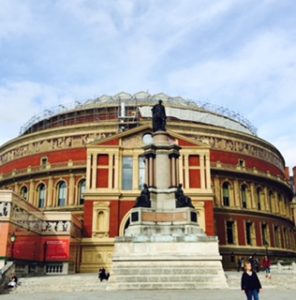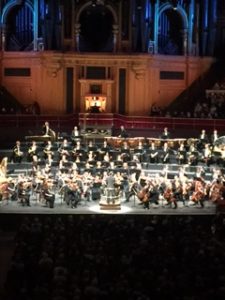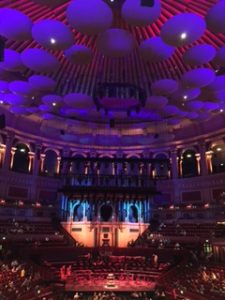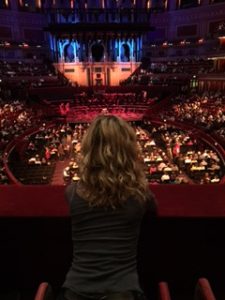Thanks for waiting. I’m weeks behind.
Before we catch up this week’s on every other Wednesdays’ scheduled post, let’s go back in time…
When deciding where to travel after Bath, I checked to see what was playing at London’s Royal Albert Hall.

London’s Royal Albert Hall
A work entitled, “The Planets” by Gustav Holst (1874-1934) sounded impressive, and there was an available single center seat — Stellar.
It was my first visit to Royal Albert Hall – first time to hear the Royal Philharmonic Orchestra in symphony with strings, woodwinds, brass, and percussion! The air tingled with elegant history…and pre-performance anticipation. I felt giddy yet regal promenading the halls. An usher led me to the Grand Tier and opened the door to my seat. I visually fell to my knees in rapture. The mushroom-like diffusers and soft illuminations of purples, reds, blues, and golds embodied a celestial aura. The conductor’s podium was spotlit…and while the stage was void of musicians, the empty chairs and music stands held as silent players. I was Alice in her Wonderland.
There are seven movements in this orchestral work, or suite, each named after a planet (hence, the name) and each wonderfully contrasted. Throughout the entire performance, the audience remained enthralled and silent. There wasn’t even the customary cougher. I’ve never seen anything like it. The Universe was speaking and we were listening, reverently.

Royal Philharmonic Orchestra

Planets in the Hall
Opening with ”Mars, the Bringer of War”– tension, drama, even fear, charged the hall. I thought my heart would jump out of my chest. Then “Venus, the Bringer of Peace”, slowed my pulse and evoked a kind of trusting inquisitiveness. By the end of the movement, I swear I believed in fairies.
In “Mercury, the Winged Messenger”, there was a playful arrival of one who is bringing news – good news. “Jupiter, the Bringer of Jollity”, brought my mind to an active awareness. How the conductor, Damian Iorio, directed Time with seemingly random gestures left me awestruck. Witnessing the musicians as they played and paused in synchronization and their instruments moving as one, I was overcome with emotion and had to wipe a tear from my cheek. This happened without warning and more than once
In the fifth movement, “Saturn, the Bringer of Old Age”, befittingly sneaked in with cautious contentment, progressed to sounds of strength and power, then transitioned to awe and wonder. Alarm then grasped hold and moved toward slight confusion (as if to say, “Wait, I’m old?! How did I get here?”) Thankfully, the notes drifted gently into those of acceptance and gratitude. (Isn’t that The Way?!)
“Uranus, the Magician” toyed with surprise and revelation. “Neptune, the Mystic”, floated and flowed in unravellings, revealings.
The composition ended with ethereal voices, sounding beyond angelic, and transported us to the outer edge of the solar system.

Surreal land…
Why do I attempt to explain with adjectives, a classical piece that is beyond classification? I can tell you that I was wholly engaged and affected by this otherworldly experience. It was a book without words. A movie without visual. Cathartic, it changed my way of thinking and continues to alter my symphonic perception and appreciation.
I invite you to find the time to give it a listen on youtube: Gustav Holst, The Planets. It’s interesting to see if you feel the movement’s intent without knowing which planet…
The more I learn, the more I’m turned on. (Isn’t that also The Way?!)
If you’d like another, check out Antonin Dvorák’s “New World”…
Til Wednesday…Merry Christmas.
“Do you realize we’re floating in space?” — Flaming Lips
Excellent! You crushed it! If Holst were alive today, you would be his muse. Have a Happy New Year.
What a kind comment, thank you. (I trust you read the revised and latest post, fewer late-night errors!)
Happy New Year with Good Fortune to you, Macker.
Music is a path of enlightenment. How wonderful that had this wonderful experience. Almost every moment in our lives is continually underscored by music…from birth, to our wedding, to our death, our celebrations, wars and victories. Have a Joyous New Year! Your loving cousin, Joanie
How insightful your comment, I adore you, Joanie. You never cease to amaze me and I treasure our blood bond. I plan on a March (or earlier) return and would love to come stay with you again…:)
My door is always open to you. Stay safe. Love you.
Thank you, honey. I look forward to our next time together…an attempted pet to Aaron for me.
Thousands of years ago, ancient civilizations turned to the heavens, marveling at their wonders. These ancient people worshiped various gods and often linked their gods with planets in the sky, which they considered to be “wandering stars.” To hear this – as you so eloquently said – “stellar” music/arrangement is heavenly…may this experience always stay with you Heidi…
Happy New Year my friend….
Happy New Year, dear. Joanna. I appreciate your astral observations! And I shall attend another philharmonic performance this weekend, in Aix en Provence. Will keep you posted. Our 2019 is going to rock and roll…